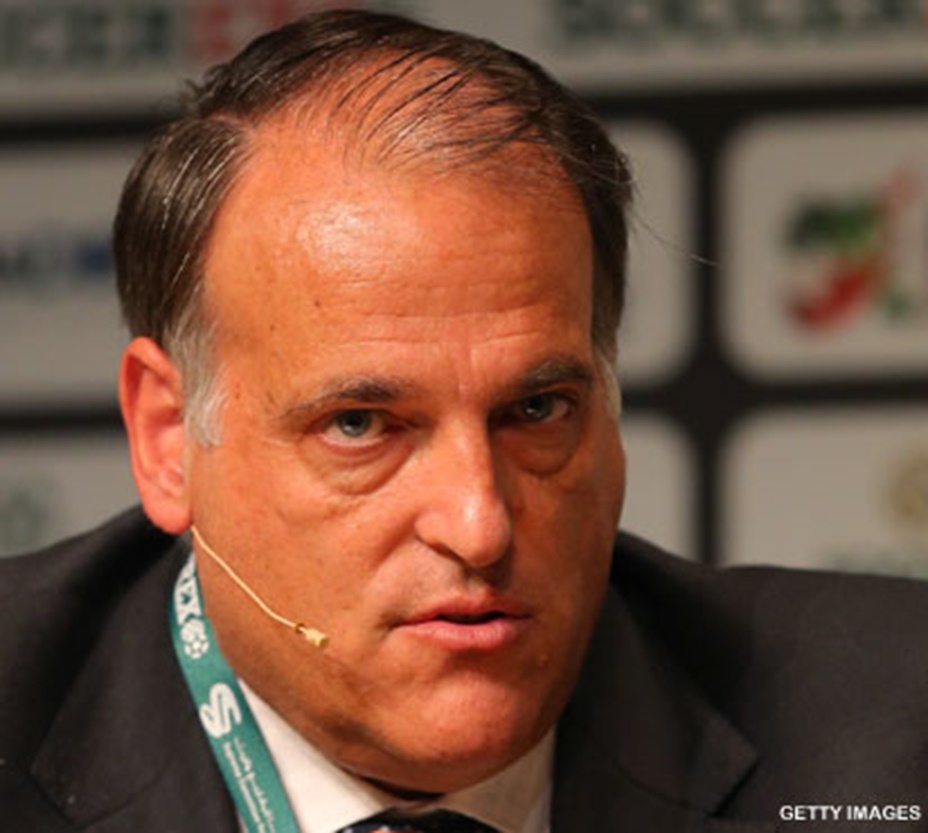News of the Premier League's new €7B ($8B) TV deal "hit hard in Spain," according to Sid Lowe of ESPN. When it comes to finances, "England is already miles ahead; now the fear is that it will disappear into the distance." Currently, the comparative TV deals mean that the Spanish league makes €755M ($862M) compared to €1.88B ($2.2B). And the imbalance in the distribution of money, "based on a system in which clubs negotiate individual contracts, makes the damage even greater." There is "already an exodus of talent" from Spain to England -- but now with the new TV deal, "the gap will grow still further." The solution, the Spanish hope, is a "new collective deal in which the total amount will grow and the distribution of the money will be more even." The league has said that the clubs agree, "but still there is no sign of an actual agreement, and announcement of the English deal brought tensions to the surface." Spain might have "some of the best footballers on the planet but, organizationally, the image of Spanish football is suffering." Spanish Football League (LFP) President Javier Tebas addressed a number of topics in a "wide-ranging interview." Below is an excerpt:
Q: What is your reaction to the Premier League TV deal and where does it leave La Liga?
Javier Tebas: My first reaction is: it's a very good contract. But you cannot
compare the two countries. For a start, you have to look at the number
of subscribers to football on pay TV: in England it is around 15
million, in Spain it is closer to 4 million. We have not exploited
football on television as well as we should have done, and that has
arrested its growth. There are a number of reasons for that: one is the
way that football is spread across different platforms, then there is
the fact that the right to "information" means that the goals are shown
almost immediately on all free-to-air channels. Then there has been the
excessive dominance of [the TV media group] Sogecable [who share the
current TV rights with Mediapro]. And then there's piracy. But
population is a factor too, of course: there are more potential
customers in the UK. Every weekend, 10 million more people are watching
football on subscription channels. We need to challenge that.
Q: So what can be done?
Tebas: It is urgentísimo, extremely urgent, that
Real Decreto [a law regulating the centralized control and sale of TV
rights] is passed. We need to impose a more rational model for the
exploitation of television rights. I think with that we can reach 8 or 9
million subscribers in the next four, five seasons if we do it right.
We have to get closer to the figures that the Premier League has, even
though we know we can't match them. And then we have to look at the
international market too. This deal is only domestic.
Q: You say urgentísimo, which sounds dramatic. Why? What's the worst-case scenario here? An exodus of players from Spain? That's already happening but will it become a mass exodus?
Tebas: Of course. If they earn €2 billion ($2.28B) more a season in England then
naturally their competitive capacity increases and ours decreases;
their ability to buy and maintain talent will be greater than ours.
Talent will leave. Players are the most important part of football, the
talent is the key and if we lose that, then ... we will lose players,
but not just to the big clubs but to smaller clubs as well. The
government has to pass the law now. Another vital question is that they
have to allow Spanish clubs to turn to investment funds: that's an issue
that we have challenged FIFA on. We're trying to stop that ruling
[banning the use of third-party investment] going through, trying to get
it overturned. If those two issues are not addressed, we have an
extremely serious situation. The numbers are clear and inescapable. If
England has more money, the talent will go there. Players will leave.
Q: But why do you need a law to be passed? ... There is nothing in the law that says that you cannot get together as a group of clubs -- the league -- and together sign a deal.
Tebas: In a sense the league is an economic cartel, holding a monopoly over football. That needs to be regulated by the government to be sure that it does not contravene regulations on monopolies and fair competition. It also means that we would have a legal framework and that it would set up a status quo, enabling us, with a two-thirds majority, to maintain a coherent collective agreement.
Q: What would be the model for a collective [TV] deal? Will it help to change the balance of power? Will money be distributed better?
Tebas: The perfect distribution for me would be: 50 percent divided evenly among the teams, 25 based on results and 25 on implantación social [in this context, audience]. We cannot keep having a difference like it is now, [where one team makes €140 million ($160M) and another makes €18 million ($20.5M)], or a difference of four or five times as much from one team to the next. One to three would be more rational. But all of this relies on the government and on the case of the investment funds on the European Union. We need that law passed and we need it now. It's urgent, or we will be faced by a grave situation (ESPN, 2/14).




